Hataras nedarim on erev Rosh Hashanah
|
The custom of being
matir neder on
erev Rosh Hashanah is based on a passage in the Gemara. The Gemara (
Nedarim 23b) says, "Someone who wants to invalidate his [future]
nedarim should declare on Rosh Hashanah that all
nedarim that I will make this year should be ineffectual." In addition to this declaration about future vows, which is recited at the end of
hatars nedarim, an additional longer passage is recited to absolve past
nedarim. The practice was moved to
erev Rosh Hashanah because
zerizim makdimin l'mitzvos-there is an eager rush to do
mitzvos. Only the
hataras nedarim segment must be recited before three men, but not the declaration. Nevertheless, it is common practice to make the declaration in front of three people too. Likewise, only one of the three is required to respond with
hakol mutarim, but usually all three say it.
(
ביאורים ומוספים דרשו, 45)
|
|
|
Hilchos Tefillin 38 (page 131)
מסעיף ד עד סעיף ח
|
|
May an Avel Wear Tefillin in Public?
Why Must an Avel Remove His Tefillin When Crying?
The Mourning Period for a Recent Death and Older Death
|

May an avel wear tefillin in public?
An
avel may not wear
tefillin on the day of the passing or burial (if it is different than the day of death) of a relative. The
navi calls
tefillin
pe'er (glory), which is not appropriate for a day of mourning. The mourner should not wear
tefillin until after sunrise of the following day. From the second day through the remainder of the
aveilus he may wear
tefillin, but not in the presence of those who have not yet seen him observing his mourning (since they might suspect him of wearing
tefillin on the first day of his mourning). The
poskim debate whether Rabbeinu Tam
tefillin are worn during
aveilus. The prevailing custom is to wear them.
(
סעיף ה וס"ק טז-כ; ביאורים ומוספים דרשו, 11-12)
|
Why must an avel remove his tefillin when crying?
An
avel who finds himself overcome with grief and about to cry must remove his
tefillin. Crying will distract him from being mindful of his
tefillin and a) he may not treat them properly, b) he is not fulfilling the
mitzva when he is distracted and the
tefillin should only be worn for a purpose, c) when in a distracted state he does not possess the proper level of fear necessary for wearing
tefillin and d) when crying he is not properly joyous as befits the wearing of
tefillin.
(
ס"ק טז; ביאורים ומוספים דרשו, 17)
|
The mourning period for a recent death and earlier death
Someone whose relative (father, mother, brother, sister, son, daughter or wife) passed away is obligated to mourn the deceased for seven days. If the relative did not hear of the death immediately but heard within thirty days, he must observe the regular mourning period. This is referred to as 'news of a recent death.' If the news reached the relative after thirty days, only a brief mourning is conducted.
(
ס"ק טז)
|
|
 |
 |
|
|
|
- According to the Mechaber, a father is responsible to educate a minor child who is capable of caring for his tefillin to wear tefillin. According to the Rama, minors should not wear tefillin since most children are incapable of caring for them properly.
- Women are exempt from tefillin as they are from all time-bound mitzvosaseh. Unlike other time-bound mitzvos which women may perform if they wish, tefillin should not be worn by women.
- A person who is incapable of keeping himself clean while wearing tefillin is both exempt from and forbidden from wearing tefillin. If he is capable of protecting himself for just a short span, he should don them between Ahava Rabbah and Shema and remove them immediately after Shema.
|
- Applying the rule of 'one who is occupied with a mitzva is exempt from other mitzvos'
- Does fulfilling a mitzva for one's pleasure exempt one from other mitzvos?
- Interrupting Torah study to don tefillin
|
|
|
|
|
|